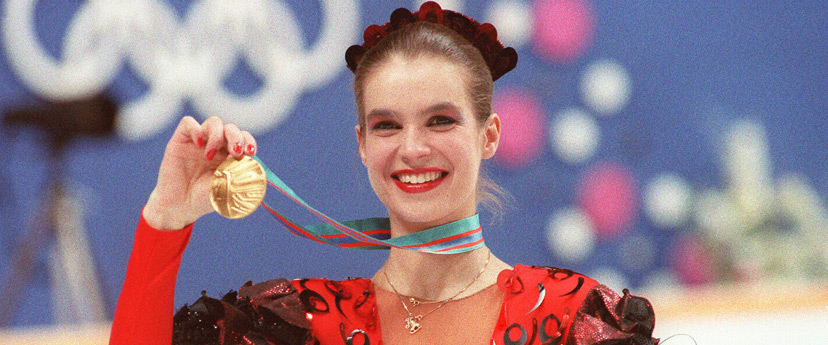Making a Doc for ESPN – The Story Behind ‘The Diplomat’

Tonight, as part of its Nine for IX Series—nine documentaries made by women about women athletes—ESPN is airing The Diplomat. It tells the story of how, at the height of the Cold War, figure skater Katarina Witt became known as “the most beautiful face of socialism.” Witt won back-to-back Olympic gold figure skating medals for East Germany and became arguably the world’s best in the sport. But her success triggered constant surveillance by the Stasi, East Germany’s notorious secret police force. The Diplomat chronicles how Witt ended up both a beneficiary and victim of the East German regime. Here, the doc’s Co-Director Jennifer Arnold, a Film Independent Fellow, shares the story behind the project.
The cold call that started it all

Jennifer Arnold
I decided I wanted to meet with ESPN because they were doing interesting stuff, so I started asking around if anyone I knew, knew any one there. I found a connection through friends and once I had a phone meeting on the books, I called Senain Khesghi. We didn’t know each other well, but we had met a few times. I was under the impression she had worked at ESPN [she hadn’t], so I called her for advice. She ended up pitching me the story of Katarina Witt. When I got on phone with ESPN, I pitched a series, and found out that that division was being downsized, but they asked if I had any ideas for a one-off. They were just putting together the Nine for IX series and were looking for looking for women documentary directors making films about women athletes. [Nine for IX] was far enough along that they expressed interest [in the Katarina story] very quickly, and we found ourselves directing a film together.
How they convinced Katarina to do the project
Katarina is an incredible businesswoman, and not that she didn’t want to do the film, but she was interested in doing her own film about her story. We had gone to Chemnitz, which used to be Karl-Marx-Stadt, East Germany to scout, and saw the ice rink where she’d trained. The architecture was so reminiscent of what we saw as Eastern Block, beautiful and modern, we wanted to focus on the rink, which is where Katarina was practically raised. The Stasi was in this rink and so were Katarina’s personal dreams, so we pitched her a story focused on the rink and she agreed to do it.
On the complicated politics of sports during the Cold War
We read headlines in the U.S. that said she had been spied on in East Germany and other (false) headlines saying she was an informant for the Stasi, but what we heard and read in the U.S. media was often sensationalized and not always accurate. We had to read German press, and ended up talking to a lot of people from East Germany who had a very different perspective from the American perspective. Saying things like someone was Stasi isn’t always black and white. Katarina was labeled a beneficiary of the secret police though she was never a spy. Athletes had a unique role in East Germany. They were separate. Everything given to them by the government, all their training, all their equipment was paid for by the state. East Germany wasn’t always diplomatically recognized as nation, so the government made the decision that if they could dominate sports, their anthem would be played, their flag would be flown. Athletics were used by both East and West throughout the Cold War to show the dominance of Eastern or Western political systems. Winning an event was seen as proof that capitalism, or socialism, or communism was the better system. We talked to last leader of East Germany, [Egon Krenz]. He said, “All sports was political at that time. History is written by the winners, so we’re blamed for using sport, but everyone did it.“
Rolling with the punches
There was a series of setbacks. On day one of the shoot, our German producer had to leave for personal reasons. Suddenly, Senain and I, not understanding production in Germany, were on our own. One of us would produce during day—literally, we had to figure out things like how get lunch—and the other would direct, and we’d trade off. We had to tag team and that was incredibly chaotic, but it really unified us as a team.
How they handled the challenges of co-directing
There’s so many different stories we could have told in this film, and Senain and I were interested in different aspects of Katarina’s life. But we knew it was only going to be an hour-long film, and considering it was a television schedule, we didn’t have a lot of time to nail a story ahead of time and then go shoot that story. It was unrealistic. Senain was originally drawn to the politics of that story, especially to the politics of East Germany. She was interested in the Stasi and I was interested in Katarina’s hopes and dreams and her character drive. Senain and I fought all the time about the balance of those two ideas until the very end. When we were finishing the film for Tribeca [for its theatrical premiere] I’d say, ‘fine, you put that scene in and I’ll put this scene.’ By each of us trying to keep a piece of what we were drawn to in the beginning, we struck a balance. When we pitched it as a team, in reality, we had never made a film together. We both are strong willed women, but we pride ourselves on professionalism. When it got emotional, we could take a step back. And in the end, we can both say this is the film we wanted to make.
On the importance of relationships
I relied on many of the people I had met in the FIND network as a writer/director. I turned to people for notes and advice on financing. It just happened that my career took off in the documentary world, but I relied on everyone I had met in the narrative world as well, people from the FIND staff and Director’s Lab. So much of filmmaking has to do with relationships and how people speak about you. You always hear about people before you meet them. Everyone you meet, it doesn’t matter if you’re directing TV or documentary or narrative, your network of friends and professional relationships are laying down the path that you’re going to walk on.
The Diplomat premieres on August 6 at 8 pm EST on ESPN as part of ESPN Films’ and espnW’s Nine for IX series.